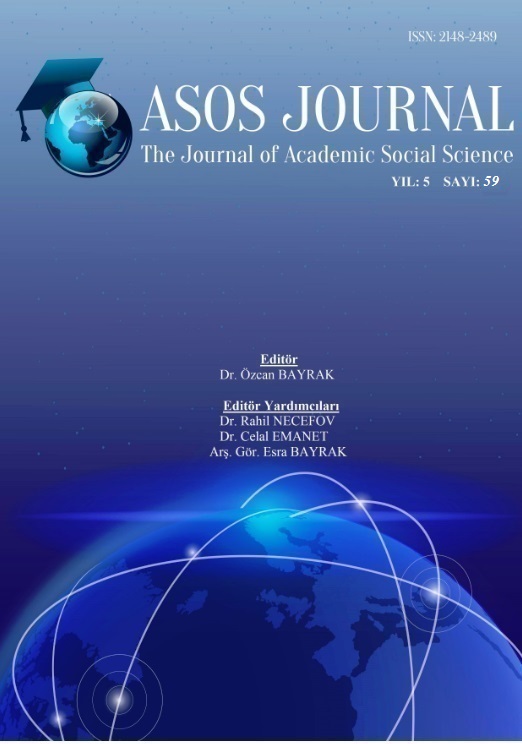Author :
Abstract
1990’lar özellikle Doğu Bloğu devletlerinde yaşanan gelişmelerin, tüm uluslararası siyasal sistemi etkilediği yıllar olmuştur. Balkanlar ve Kafkasya gibi hem Doğu Bloğu devletlerinin etkisinde olan hem de çok kültürlü bölgeler, siyasal sistemdeki bu değişimden çatışma olarak da etkilenmiştir. Özellikle Balkanlarda bulunan Eski Yugoslavya, etnik, dini ve kültürel ayrımın halkları birbirinden ayırdığı ve bu ayrım sebebiyle her an çatışmaya dönebilecek hassas bir denge üzerinde yaşamın sürdüğü bir bölgedir. Bu hassasiyetin ne kadar tehlikeli olduğu ise, 1990 kırılmasında görülmüş, otonom bölgelerin tekrar düzenlenmesi farklı yorumların da ortaya çıkmasına sebep olmuştur. Kosova Örneğinde olduğu gibi farklı özelliklere sahip ve bağımsızlık isteyen bu bölgeler, bağımsızlıkları için hem hukuksal hem de siyasi bir dayanak noktası aramışlar ve devletlerle ilişkiler içerisine girmişlerdir. Birleşmiş Milletler, NATO ve Avrupa Birliği gibi uluslararası örgütlerin, gittikçe güçlenen ve devletlerin egemenliğini aşındıran durumları da göz önüne alındığında, bağımsızlıklar ve kabulü, birçok denklem ve tartışmayı da bir araya getirmektedir. Bu çalışmada Kosova’nın bağımsızlık süreci ve bu sürece Birleşmiş Milletler’in etkisi ortaya konmaya çalışılmıştır.
Keywords
Abstract
1990s are the years in which the developments taking place in Eastern Bloc states impacted the whole international political system. The regions both being multinational and being under the influence of Eastern Bloc States such as Balkans and Caucasia were affected by this change in the political system in terms of conflicts. Especially former Yugoslavia located in Balkans is an area where ethnicity, religious and cultural differences cause discrimination among public and the life there is led on a delicate balance which is likely to turn into conflict due to this discrimination in any minute. It was verified how dangerous this delicacy was in the collapse taking place in 1990 and the recognition of the autonomous regions led to new comments and perspectives to emerge. Like in the example of Kosovo, the regions having different features and desiring to be independent looked for both legal and political support and started to establish relations with other states. Independence and its recognition bring about so many discussions and controversies when the conditions of international organizations such as United Nations, NATO and European Union becoming more and more powerful every day and diminishing the sovereignty of the states are taken into consideration. In this paper, it is aimed to analyze the process of Kosovo's gaining its independence and the effect of United Nations on this process.
Keywords
- Göç, İstanbul, Kum Saati Yayınları, 2001.
- Akman, Halil, Yugoslavya’nın Dağılma Sürecinde Türkiye’nin İç Siyasi Durumu ve Dağılmaya Yaklaşımı, Asos Journal Akademik Sosyal Araştırmalar Dergisi, Yıl: 3, Sayı: 16, Eylül 2015, s. 139-156.
- Ali Balcı, “Kosova: Arnavut Sorununun Kilit Bölgesi”, Dünya Çatışmaları, Çatışma Bölgeleri ve Konuları, Ed. Kemal İnat, Burhanettin Duran, Muhittin Ataman, Ankara, Nobel Yayınları, 2010.
- Avusturya Dışişleri Bakanlığı, Kosova’nın tanınması kararı (Çevrimiçi) http://www.bmeia.gv.at/aussenministerium/aktuelles/presseaussendungen/2008/plassnik -schreiben-ueber-anerkennung-des-kosovo-unterzeichnet.html, 21 Aralık 2010.
- Beyaz Saray Arşivi (Çevrimiçi) http://georgewbush-whitehouse.archives.gov/news/ relea- ses/2008/02/ 20080218-3.html, 21 Aralık 2010.
- BBC Haber Sitesi, Muslim in Europe: Country Guide (Çevrimiçi), http://news.bbc.co.uk/2/hi/europe/4385768.stm, Erişim Tarihi: 01.11.2011.
- Fransa Dışişleri Bakanlığı, (Çevrimiçi) http://www.diplomatie.gouv.fr/fr/pays-zones- geo_833/bosnie-herzegovine_444/index.html, 21 Aralık 2010.
- Mary Buckley and Slly N. Cummings, New York, The Cromwell Press, 2001.
- Gellner, Ernest: Uluslar ve Ulusculuk, Çev. Büşra Ersanlı Behar, Günay Göksu Özdoğan, İnsan Yayınları, İstanbul, 1992.
- 63 Kosova’yı Şubat 2017’de Bangladeş tanımıştır (Çevrimiçi) http://www.newsbangladesh.com/english/details/22917
- 07 Ekim 2017
- Jansen, G. Richard: “Albanians and serbs in Kosovo: An Abbreviated History An Opening for the Islamic Jihad in Europe”. Colorado State University, 25 Nisan 1999, (Çevrimiçi) http://lamar.colostate.edu/~grjan/kosovohistory.html, 21 Aralık 2010.
- Jelavich, Barbara:Balkan Tarihi, 18. Ve 19. Yüzyıllar, İstanbul, Küre Yayınları, 2006
- Karatay, Osman: Kosova, Kanlı Ova, İstanbul, İz Yayıncılık, 1998.
- Keesing’s Record of World Events:Volume 37 (1991), Ed. by. Roger East, 60 Year of Publica- tion, Cambridge, Longman.
- Keesing’s Record of World Events:Volume 39 (1993), Ed. by Roger East, 60 Year of Publica-
- Kosova Bağımsızlık Bildirisi, (Çevrimiçi) http://www.assembly-kosova.org/common/ docs/Dek_Pav_e.pdf, 19 Kasım 2011.
- Kosova Dışişleri Bakanlığı, (Çevrimiçi) http://www.mfa-ks.net/?page=2,33. ,21 Aralık 2010.
- Kut, Şule:“Kosova:Milliyetçiliğin Kördüğümü”, Foreing Policy, İstanbul Bilgi Üniversitesi Yayını, Güz, 1998, s.53-64.
- Kuzu, Ender, Uluslararası Hukukta Tanınma ve Kosova’nın Tanınması Sorunu, Yüksek Lisans Tezi, İstanbul Üniversitesi, İstanbul, 2011.
- Political Developments in Kosovo, Nations Archives, (Çevrimiçi) http://tna.europarchive.org/ 20080523130646/http://www.britischebotschaft.de/en/news/items/080218a.htm, 21
- Ramet, Sabrina P.:Serbia, Croatia and Slovenia at peace and War: selected writings, 1983-2007. Berlin, Lit Verlag, 2008.
- Robert, Elsie: Historical Dictionary of Kosovo, Oxford, Scarecrow Press, 2004.
- Samancı, Uğur : Uluslararası Adalet Divanının Kosova’nın Bağımsızlık İlanına İlişkin Danışma Görüşü, s.166. , (Çevrimiçi)http://web.deu.edu.tr/hukuk/dergiler/dergimiz11-2/4samanci.pdf, 13 Kasım 2011.
- St. Egidio Antlaşması için bkz. (Çevrimiçi) http://www.santegidio.org/news/ rasseg- na/00000/19980530_peaceworks1_EN.htm, 21 Ekim 2011.
- TC Dışişleri Bakanlığı Resmi Sitesi, (Çevrimiçi) http://www.mfa.gov.tr/sayin-bakanimizin- turkiye_nin-kosova_yi-tanidigina-dair-aciklamasi_-18-subat-2008.tr.mfa, 21 Aralık
- UN Documentation, BM Güvenlik Konseyi S/RES/1160 (1998) Sayılı Karar, (Çevrimiçi) http://www.un.org/Docs/scres/1998/scres98.htm, 13 Haziran 2011.
- UN Documents, BM Güvenlik Konseyi S/RES/1244 (1999) Sayılı Karar, (Çevrimiçi) http://daccess-ddsny.un.org/doc/UNDOC/PRO/N99/854/44/PDF/N9985444 .pdf?OpenElement 1 Kasım2011.
- UN Documents, BM Genel Sekreterinin S/1999/779 Sayılı Raporu, (Çevrimiçi) http://www.unmikonline.org/UNMIKONLINE2009/misc/docs/sc-reports/S-1999779.pdf> 15 Ocak 2011.
- UN Documents, BM Genel Sekreterliği Raporları S/2007/395, Report of the Secretary-General on the United Nations Interim Administration Mission in Kosovo, , (Çevrimiçi) http://www.un.org/Docs/sc/sgrep07.htm, 11 Kasım 2010.
- UN Documents, BM Genel Sekreterliğii Raporları, S/2007/568 Report of the Secretary-General
- UN Documentation, BM Güvenlik Konseyi, S/PV. 5839 Sayılı Görüşme, 18 Şubat 2010 Tarihli, (Çevrimiçi) http://www.securitycouncilreport.org/atf/cf/%7B65BFCF 9B-6D27-4E9C8CD3-CF6E4FF96FF9%7D/Kos%20S%20PV%205839.pdf, 26 Aralık 2010.
- UN Documents, BM Genel Sekreterliği Raporları S/2007/768 (2008) Report of the Secretary- General on the United Nations Interim Administration Mission in Kosovo, , (Çevrimiçi)
- UN Documents, BM Genel Sekreterliği Raporları S/2007/134 (2007), Report of the Secretary-
- Uzgel, İlhan:Balkanlarla İlişkiler, Der. Baskın Oran, Türk Dış Politikası, Kurtuluş Savaşından Bu Güne Olgular Belgeler Yorumlar, 1919-1980, C.I , İletişim Yayınları, 2001.
- Yugoslavya 1946 Anayasa’sı (Çevrimiçi) http://www.worldstatesmen.org/Yugoslavia_1946.txt,
- Yugoslavya 1953 Anayasası, (Çevrimiçi) http://www.arhivyu.rs/active/en/ ho- me/glavna_navigacija/leksikon_jugoslavije/konstitutivni_akti_jugoslavije/ustavni_zako n_1953.html, 30 Aralık 2009. Yugoslavya 1963 Anayasası, (Çevrimiçi) http://www.worldstatesmen.org/Yugoslavia_1963.txt,
- Yugoslavya 1974 Anayasası, (Çevrimiçi), http://www.osaarchivum.org/files/ hol- dings/300/8/3/text/81-3-1.shtml, 11 Kasım 2011.





